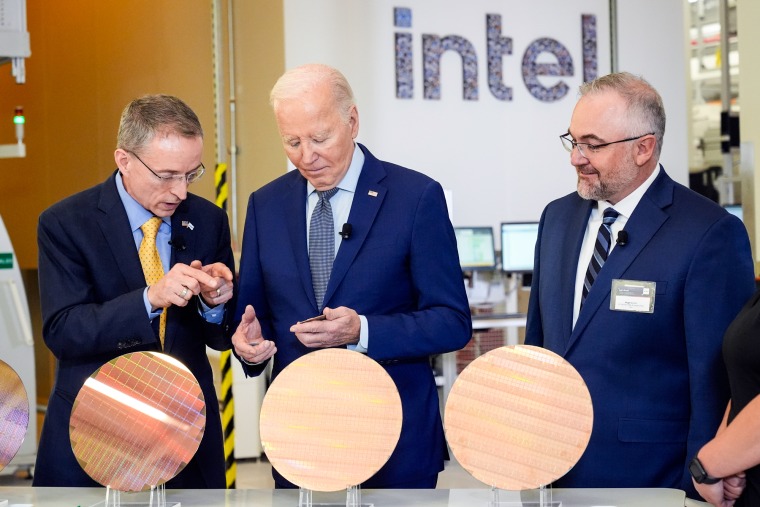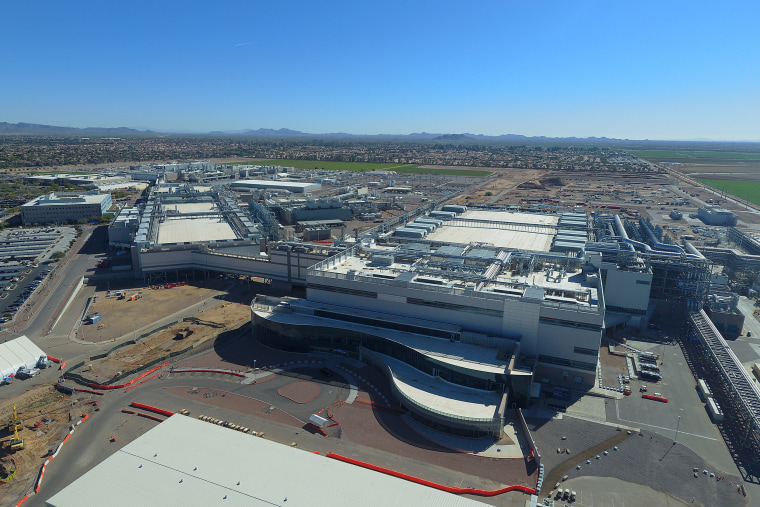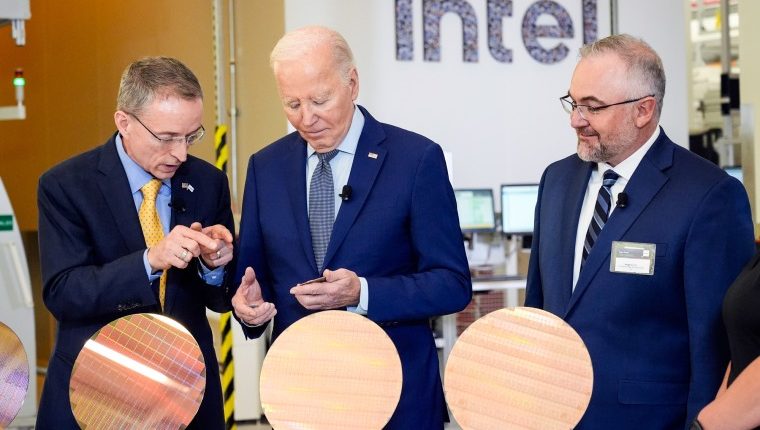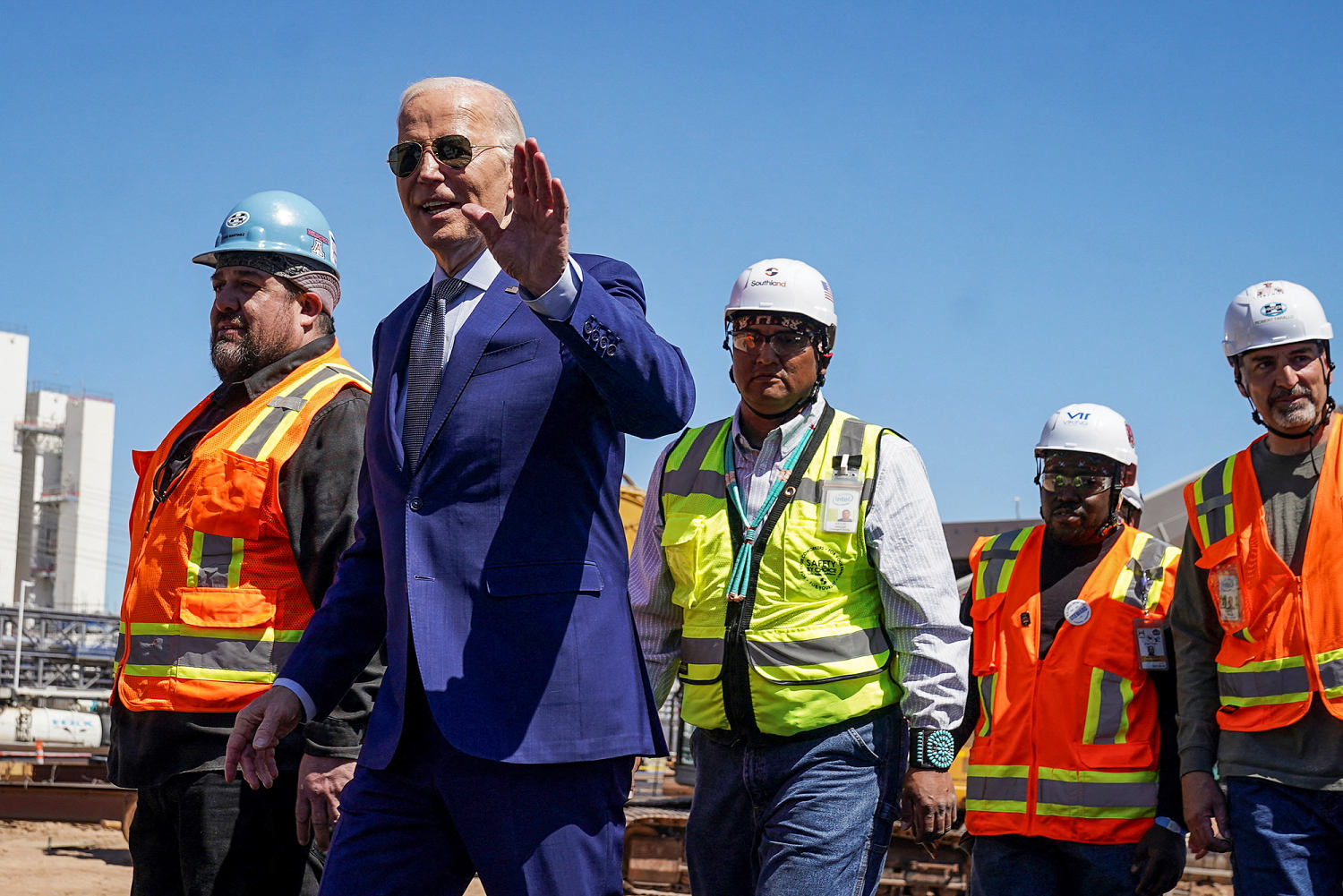CHANDLER, Ariz. — In the booming Phoenix metro area, Washington policymakers’ rare bipartisan push to bolster national security in their high-tech arms race with China brings major enthusiasm for something more basic: jobs.
A fresh influx of $8.5 billion in CHIPS and Science Act funding to help Intel build two semiconductor plants and upgrade an existing one in Chandler, 30 minutes southeast of downtown Phoenix, is expected to bring thousands of high-paying roles to the area.
“That’s what the city needs — jobs,” said Alfred Garza, a lifelong Chandler resident, who said he has watched it balloon over the years “to the point where, my God, they took all the natural beauty.”
“I hope it helps the community, because, look, this side of the city is still run-down,” he said. “Intel, I think, would be a good beginning.”
Made in America is good — to me and a bunch of others sitting up in our community.
Alred Garza of Chandler, AriZ.
The tech giant already employs 13,000 people in the Phoenix area, and the White House forecasts the Arizona projects will create 3,000 more manufacturing roles and at least twice that many construction jobs — on par with the gains expected in Ohio, the second of four states, along with New Mexico and Oregon, where the federal grants are helping Intel expand its chip operations.
“Made in America is good — to me and a bunch of others sitting up in our community,” Garza said.
It’s a sentiment that many officials on the ground in Chandler were happy to talk up Wednesday.
“The CHIPS and Science Act is a huge jobs creator,” National Economic Council Director Lael Brainard told NBC News, adding that the impact would go beyond Intel’s own workforce. “That also leads to all kinds of nearby restaurants’ having business, nearby service small businesses’ starting up and hiring workers of their own.”

The funding for Intel, which also includes up to $11 billion in loans, is the latest award in a $52.7 billion pool that began being doled out late last year. The first grant, of just $35 million, went to help BAE Systems expand its chipmaking for fighter jets in Nashua, New Hampshire.
Now, much larger awards are heading out the door, focusing largely on semiconductor heavyweights like Intel, the only U.S. firm that both designs and builds high-end chips.
But relative to the Biden administration’s billions of dollars in other domestic spending — namely from the Inflation Reduction Act and the Bipartisan Infrastructure Law — the CHIPS funding’s primary purpose isn’t to juice the domestic economy. It’s to insulate the country’s chip supplies from an intensifying rivalry with China, whose ambitions to take control of Taiwan, a self-governing island and global chip production hub, helped speed the bipartisan package through Congress in 2022.
We want this industry here. … It’s more important than where the oil reserves have been for the last 50 years.
Intel CEO Pat Gelsinger
“After three decades of these supply chains drifting to Asia, all of a sudden we realized we’re not building them in the U.S. anymore,” Intel CEO Pat Gelsinger told NBC News on Wednesday, referring to pandemic-era chip shortages that highlighted “both the economic and the national security implications of such a critical industry.”
“I think of the CHIPS Act as the most important piece of industrial policy legislation since World War II,” he said, noting that technologies from electric vehicles to generative AI all depend on semiconductors. “We want this industry here. … It’s more important than where the oil reserves have been for the last 50 years.”
But all politics is local, as the saying goes — even when it’s geostrategic, too.
“These are great jobs,” Gelsinger said, citing opportunities for pipefitters, welders, construction workers, wafer technicians and “the highest-end Ph.D.s inventing new molecules. But it’s also the communities that support them,” he said. “It’s the schoolteachers, the police officers — this is just great for the economy.”
And in a purple state like Arizona, which he won in 2020 by a little more than 10,000 votes, Biden isn’t missing any opportunities to tout economic development.
Speaking at an event celebrating the deal Wednesday, Biden said that the Phoenix-area jobs spurred by the grant to Intel would pay over $100,000 a year on average and that many would be unionized and not require college degrees.
“That’s a change!” he declared.
Aaron Pool, founder of Gadzooks Enchiladas and Soup, said he hoped the new chip plants, commonly known as “fabs,” would mean more diners for his restaurant chain after hybrid work has dented foot traffic.
“Wednesday it will pop, and then it’s just kind of quiet,” he said of the downtown Chandler location. “Pulling the people from the chip fab over here, I think we’re going to see that translate at some point.”
Todd Sanders, CEO of the Greater Phoenix Chamber of Commerce, said expectations like Pool’s are common in the local business community.
“People are aware of what’s happening,” he said. “Small businesses are looking for ways that they can be a part of that ecosystem.”
In addition to Intel, the Taiwanese chip manufacturer TSMC also has a footprint in Phoenix already and plans to build its second U.S. semiconductor factory in the metro area. While that project has been delayed, the company is also expected to receive CHIPS Act funds to support it.

The Phoenix-Mesa-Chandler metro area swelled by roughly 200,000 people from 2020 to last year, according to census estimates released last week. As the chip industry plots its local expansion, some residents fear an influx of well-paid workers could keep pressure on inflation, which Pool said has been “brutal” on Gadzooks, citing higher costs for everything from labor to beef.
“A lot of people say that’s going to drive up prices even more on housing and everything,” he said. Already, rents in Maricopa County are up 37% since 2020, according to Zillow, and mortgages are up 53% over that period, according to Redfin.
“We’re at a point where you can’t raise prices anymore,” Pool said. “Consumers won’t allow it.” That has left some area business owners in what he called a “holding pattern,” waiting to see what turn the regional economy takes next.
After surging to 13% in the summer of 2022, 4 percentage points above the U.S. peak around the same time, inflation in Phoenix has slowed to 2.2%, beneath the current 3.2% level nationally. Since that roller coaster ride, Pool said, the city’s business climate has “just been kind of lethargic.”
Sanders remains optimistic, nodding to efforts to diversify the state’s business base and invest in infrastructure while minimizing “burdensome” regulations.
“I don’t know that companies moving here are going to create inflation,” he said — and then pointed back to the one thing on everybody’s minds: “I think what they’re going to do is create jobs.”
Source: | This article originally belongs to Nbcnews.com










